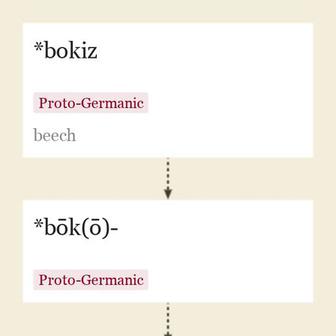check-book n.
also checkbook, cheque-book, "
Entries linking to check-book
c. 1300, in chess, "
As "
Hence: "
From its use in chess the word has been widely transferred in French and English. In the sense-extension, the sb. and vb. have acted and reacted on each other, so that it is difficult to trace and exhibit the order in which special senses arose [OED]
The meaning "

Middle English bok, from Old English boc "
Latin and Sanskrit also have words for "
The sense gradually narrowed by early Middle English to "
The use of books or written charters was introduced in Anglo-Saxon times by the ecclesiastics, as affording more permanent and satisfactory evidence of a grant or conveyance of land than the symbolical or actual delivery of possession before witnesses, which was the method then in vogue. [Century Dictionary]
From c. 1200 as "
updated on November 06, 2017